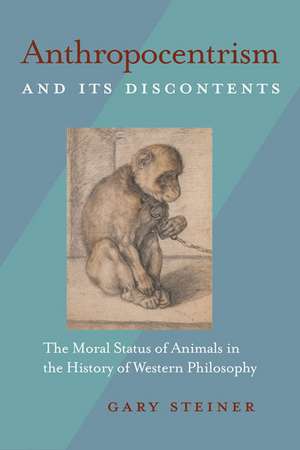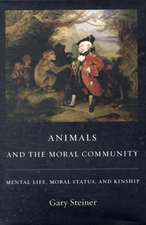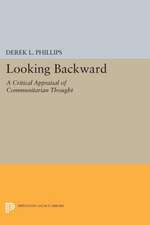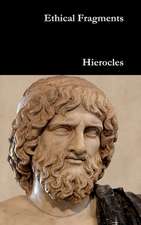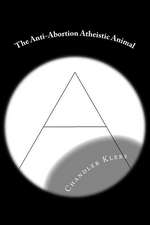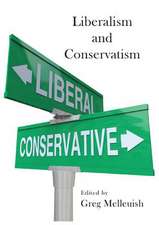Anthropocentrism and Its Discontents: The Moral Status of Animals in the History of Western Philosophy
Autor Gary Steineren Limba Engleză Paperback – 30 aug 2010
Anthropocentrism and Its Discontents is the first-ever comprehensive examination of views of animals in the history of Western philosophy, from Homeric Greece to the twentieth century.
In recent decades, increased interest in this area has been accompanied by scholars’ willingness to conceive of animal experience in terms of human mental capacities: consciousness, self-awareness, intention, deliberation, and in some instances, at least limited moral agency. This conception has been facilitated by a shift from behavioral to cognitive ethology (the science of animal behavior), and by attempts to affirm the essential similarities between the psychophysical makeup of human beings and animals.
Gary Steiner sketches the terms of the current debates about animals and relates these to their historical antecedents, focusing on both the dominant anthropocentric voices and those recurring voices that instead assert a fundamental kinship relation between human beings and animals. He concludes with a discussion of the problem of balancing the need to recognize a human indebtedness to animals and the natural world with the need to preserve a sense of the uniqueness and dignity of the human individual.
In recent decades, increased interest in this area has been accompanied by scholars’ willingness to conceive of animal experience in terms of human mental capacities: consciousness, self-awareness, intention, deliberation, and in some instances, at least limited moral agency. This conception has been facilitated by a shift from behavioral to cognitive ethology (the science of animal behavior), and by attempts to affirm the essential similarities between the psychophysical makeup of human beings and animals.
Gary Steiner sketches the terms of the current debates about animals and relates these to their historical antecedents, focusing on both the dominant anthropocentric voices and those recurring voices that instead assert a fundamental kinship relation between human beings and animals. He concludes with a discussion of the problem of balancing the need to recognize a human indebtedness to animals and the natural world with the need to preserve a sense of the uniqueness and dignity of the human individual.
Preț: 424.88 lei
Nou
Puncte Express: 637
Preț estimativ în valută:
81.31€ • 84.37$ • 67.96£
81.31€ • 84.37$ • 67.96£
Carte tipărită la comandă
Livrare economică 15-29 martie
Preluare comenzi: 021 569.72.76
Specificații
ISBN-13: 9780822961192
ISBN-10: 0822961199
Pagini: 344
Dimensiuni: 156 x 235 x 23 mm
Greutate: 0.5 kg
Ediția:1
Editura: University of Pittsburgh Press
Colecția University of Pittsburgh Press
ISBN-10: 0822961199
Pagini: 344
Dimensiuni: 156 x 235 x 23 mm
Greutate: 0.5 kg
Ediția:1
Editura: University of Pittsburgh Press
Colecția University of Pittsburgh Press
Recenzii
“Steiner’s work is a rigorous and stimulating reappraisal of the long-lasting and often baleful influence of Greek philosophy on Western attitudes towards animals.”
--New England Classical Journal
--New England Classical Journal
“Steiner has provided a needed and lucid account of the history he targets.”
—Journal of the History of Philosophy
—Journal of the History of Philosophy
“This book will be highly valuable to scholars of animal rights/welfare as a historical overview of this issue, and an excellent introduction to the history of Western philosophy in general. Highly recommended.”
—Choice
—Choice
Notă biografică
Gary Steiner is John Howard Harris Professor of Philosophy at Bucknell University. He is the author of Animals and the Moral Community: Mental Life, Moral Status, and Kinship, and Descartes as a Moral Thinker: Christianity, Technology, Nihilism. He is also the translator of Prauss’s Knowing and Doing in Heidegger’s “Being and Time” and Löwith’s Martin Heidegger and European Nihilism.
Descriere
Anthropocentrism and Its Discontents is the first-ever comprehensive examination of views of animals in the history of Western philosophy, from Homeric Greece to the twentieth century.
